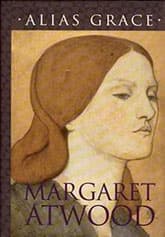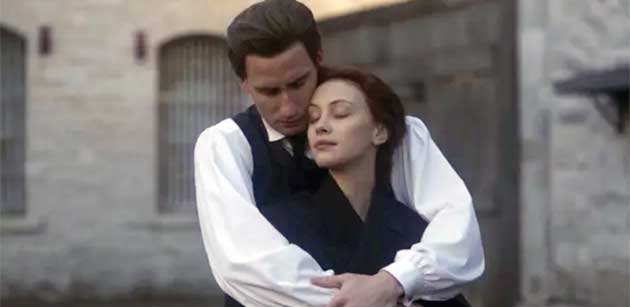Alias Grace
Critique • Quotes • At the movies
 First edition
First editionFirst publication
1996, Canada
Literature form
Novel
Genres
Historical fiction, literry fiction
Writing language
English
Author's country
Canada
Length
Approx. 158,000 words

Dr. Jordan (Edward Holcroft) fantasizes embracing Grace (Sarah Gadon) in Alias Grace series.
An enchanted confusion
Alias Grace (2017): Miniseries, six episodes, 268 minutes; director Mary Harron; writer Sarah Polley; featuring Sarah Gadon, Edward Holcroft, Rebecca Liddiard, Paul Gross, Zachary Levi, Anna Paquin, David Cronenberg
The long road Canadian actress, writer and filmmaker Sarah Polley took in getting her adaptation of Margaret Atwood's Alias Grace to the small screen has been told often in recent years, but suffice it to say it was on Polley's mind for two decades.
I don't know how much this long gestation had to do with the eventual success of the project but the Alias Grace miniseries, written by Polley and directed by Mary Harron, is as impressive as the original novel.
First of all, it's impressive how faithful the series is to the novel. The plot is practically identical to that of the book. Several times you may think you are catching it taking off on flights of fancy but a quick check of Atwood's text will confirm those scenes or themes were there in the original. The show might even bring out a few significant points you may have glossed over in the book.
Of course, some compression is required in any adaptation to the visual medium. But it is done carefully here. For example, Dr. Simon Jordan's sordid relationship with his landlady, when he really yearns for Grace, is included but greatly curtailed. The screenplay also loses much ofthe doctor's research and consultation with colleagues. Same for many of the details Grace relates about her early apprenticeship as a serving girl. All of these cuts result in no great ill effect.
Key bits of the dialogue and of Grace's thoughts in the film also come directly from Atwood's pen, though again this shows the adapter's skill in knowing which parts of which passages to pick up from among the many pages of text.
Most remarkable is how well much of the book's text, which spelled out everything verbally, is translated into scenes that tell the story graphically.
Official trailer for 2017 miniseries adaptation of Alias Grace.
Despite all this work though, such a production can rise or fall on the casting—especially in the lead role of the enigmatic convicted murderer Grace Marks. Like Mona Lisa the actress has to keep the viewer guessing.
There's a lot of classic painterly effects in the acting of Sarah Gadon, as her face often fills the screen. With the slightest of animation her placid stare into the camera (into Dr. Jordan, into us) by turns invites sympathy, flirts, becomes abashed, and dismisses. We can understand the doctor's enchantment.
Gadon won a Canadian Screen Award for the marvelous performance, a lesson in "less is more".
British actor Edward Holcroft has a more thankless task in portraying Jordan, the ambitious but ultimately weak-willed psychiatrist who is manipulated by and falls for Grace. He also has less to play with here, as the man's role is reduced in favour of more screen time for Grace. But he acquits himself well in it. We feel his confusion.
More affecting are Grace's friends, Mary Whitney (Rebecca Liddiard) and Nancy Montgomery (Anna Paquin), her fellow servants exploited and ruined by their masters. It could be argued that the story of the three women—their relationships to their betters, to other men and to each other—is the real heart of this production. And perhaps of the novel itself.
— Eric

